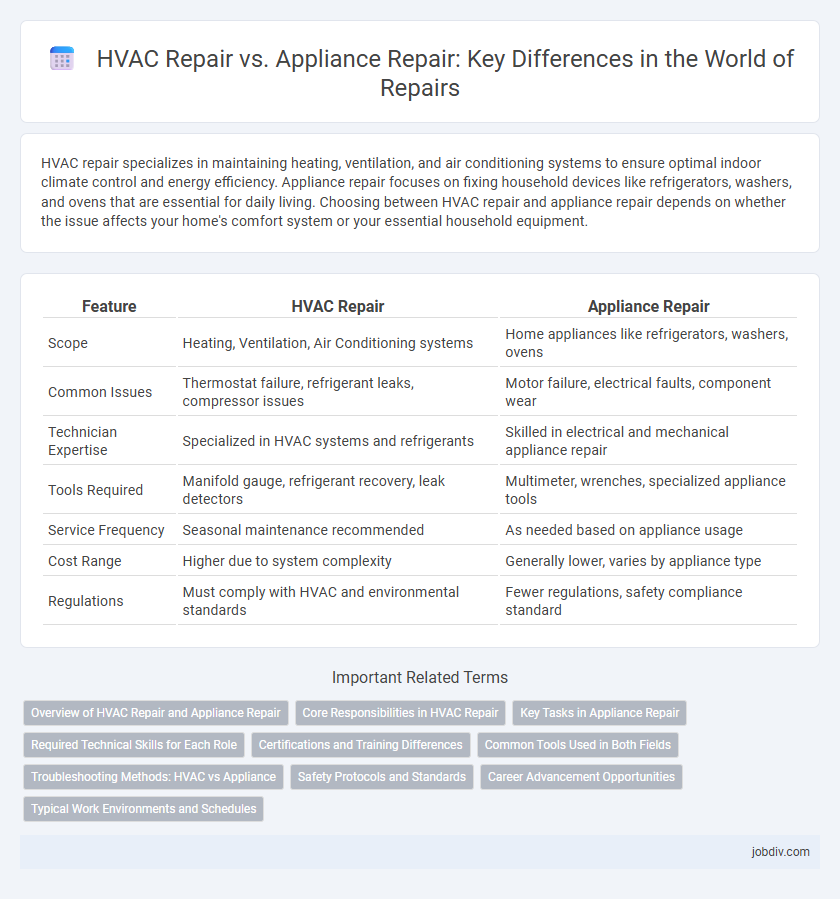HVAC repair specializes in maintaining heating, ventilation, and air conditioning systems to ensure optimal indoor climate control and energy efficiency. Appliance repair focuses on fixing household devices like refrigerators, washers, and ovens that are essential for daily living. Choosing between HVAC repair and appliance repair depends on whether the issue affects your home's comfort system or your essential household equipment.
Table of Comparison
| Feature | HVAC Repair | Appliance Repair |
|---|---|---|
| Scope | Heating, Ventilation, Air Conditioning systems | Home appliances like refrigerators, washers, ovens |
| Common Issues | Thermostat failure, refrigerant leaks, compressor issues | Motor failure, electrical faults, component wear |
| Technician Expertise | Specialized in HVAC systems and refrigerants | Skilled in electrical and mechanical appliance repair |
| Tools Required | Manifold gauge, refrigerant recovery, leak detectors | Multimeter, wrenches, specialized appliance tools |
| Service Frequency | Seasonal maintenance recommended | As needed based on appliance usage |
| Cost Range | Higher due to system complexity | Generally lower, varies by appliance type |
| Regulations | Must comply with HVAC and environmental standards | Fewer regulations, safety compliance standard |
Overview of HVAC Repair and Appliance Repair
HVAC repair involves diagnosing and fixing heating, ventilation, and air conditioning systems to ensure optimal indoor climate control and energy efficiency. Appliance repair focuses on restoring the functionality of household devices such as refrigerators, washers, and ovens, targeting mechanical or electrical faults. Both services require specialized tools and expertise to maintain safety standards and extend the lifespan of equipment.
Core Responsibilities in HVAC Repair
HVAC repair primarily involves diagnosing and fixing issues related to heating, ventilation, and air conditioning systems, ensuring optimal temperature regulation and air quality in residential or commercial settings. Core responsibilities include inspecting system components like compressors, thermostats, ducts, and refrigerant levels, performing preventative maintenance, and calibrating controls for efficient energy use. Technicians must also handle refrigerant recharge, electrical system repairs, and emergency troubleshooting to maintain HVAC system performance and indoor comfort.
Key Tasks in Appliance Repair
Appliance repair primarily involves diagnosing and fixing issues related to household devices such as refrigerators, washers, dryers, ovens, and dishwashers to restore efficient operation. Key tasks include identifying electrical or mechanical faults, replacing defective components like motors, belts, or thermostats, and ensuring appliances meet safety standards. Technicians use specialized tools and diagnostic equipment to troubleshoot problems and perform routine maintenance to prevent future breakdowns.
Required Technical Skills for Each Role
HVAC repair demands expertise in refrigeration cycles, electrical systems, and airflow dynamics, requiring technicians to diagnose complex heating and cooling issues accurately. Appliance repair involves a broad understanding of mechanical and electrical components across various household items, emphasizing troubleshooting skills and familiarity with brand-specific models. Both roles necessitate proficiency in safety protocols and the ability to interpret technical manuals, but HVAC repair often requires certifications such as EPA Section 608, highlighting its specialized regulatory requirements.
Certifications and Training Differences
HVAC repair technicians typically hold certifications such as EPA Section 608 and NATE accreditation, reflecting specialized training in heating, ventilation, air conditioning systems, and refrigerant handling. Appliance repair professionals often possess certifications like ASE or manufacturer-specific credentials, emphasizing expertise in electrical systems and component diagnostics. The divergence in certifications highlights the distinct technical knowledge and regulatory compliance required for each repair field.
Common Tools Used in Both Fields
Common tools used in both HVAC repair and appliance repair include multimeters for electrical diagnostics, screwdrivers for component access, and wrenches for tightening and loosening fittings. Technicians rely on refrigerant gauges and vacuum pumps specifically in HVAC work, while appliance repair frequently utilizes socket sets and wire strippers for intricate electrical connections. Mastery of these tools enhances precision and efficiency in troubleshooting and repairs across both fields.
Troubleshooting Methods: HVAC vs Appliance
HVAC repair troubleshooting involves diagnosing complex issues related to heating, ventilation, and air conditioning systems, such as refrigerant leaks, thermostat malfunctions, or compressor failures, often requiring specialized tools like multimeters and pressure gauges. Appliance repair troubleshooting focuses on identifying faults in household devices like refrigerators, washing machines, or ovens by examining electrical components, control boards, and mechanical parts using diagnostic tests and visual inspections. Both fields demand knowledge of system-specific schematics and operational principles but apply distinct testing methods based on the equipment complexity and functionality.
Safety Protocols and Standards
HVAC repair involves strict adherence to safety protocols such as handling refrigerants according to EPA regulations and ensuring proper electrical system checks, reducing risks of leaks and electrical hazards. Appliance repair requires compliance with manufacturer guidelines and electrical safety standards to prevent fire hazards and ensure correct operation. Both fields emphasize the importance of certified technicians trained in safety standards like OSHA to protect homeowners and maintain system integrity.
Career Advancement Opportunities
HVAC repair offers broader career advancement opportunities due to the industry's complexity and demand for specialized skills in heating, ventilation, and air conditioning systems. Appliance repair is often more limited to household or commercial device maintenance, providing fewer pathways for specialization or management roles. Technicians aiming for growth may find HVAC repair more promising because of certifications, higher earning potential, and expanding smart technology integration.
Typical Work Environments and Schedules
HVAC repair specialists typically work in environments ranging from residential homes to commercial buildings, often facing outdoor conditions when servicing units like air conditioners and furnaces. Their schedules may include emergency calls and after-hours work due to system failures impacting climate control. Appliance repair technicians usually operate indoors within homes or appliance service centers, maintaining more regular business hours but occasionally handling urgent repairs for essential household appliances.
HVAC Repair vs Appliance Repair Infographic

 jobdiv.com
jobdiv.com